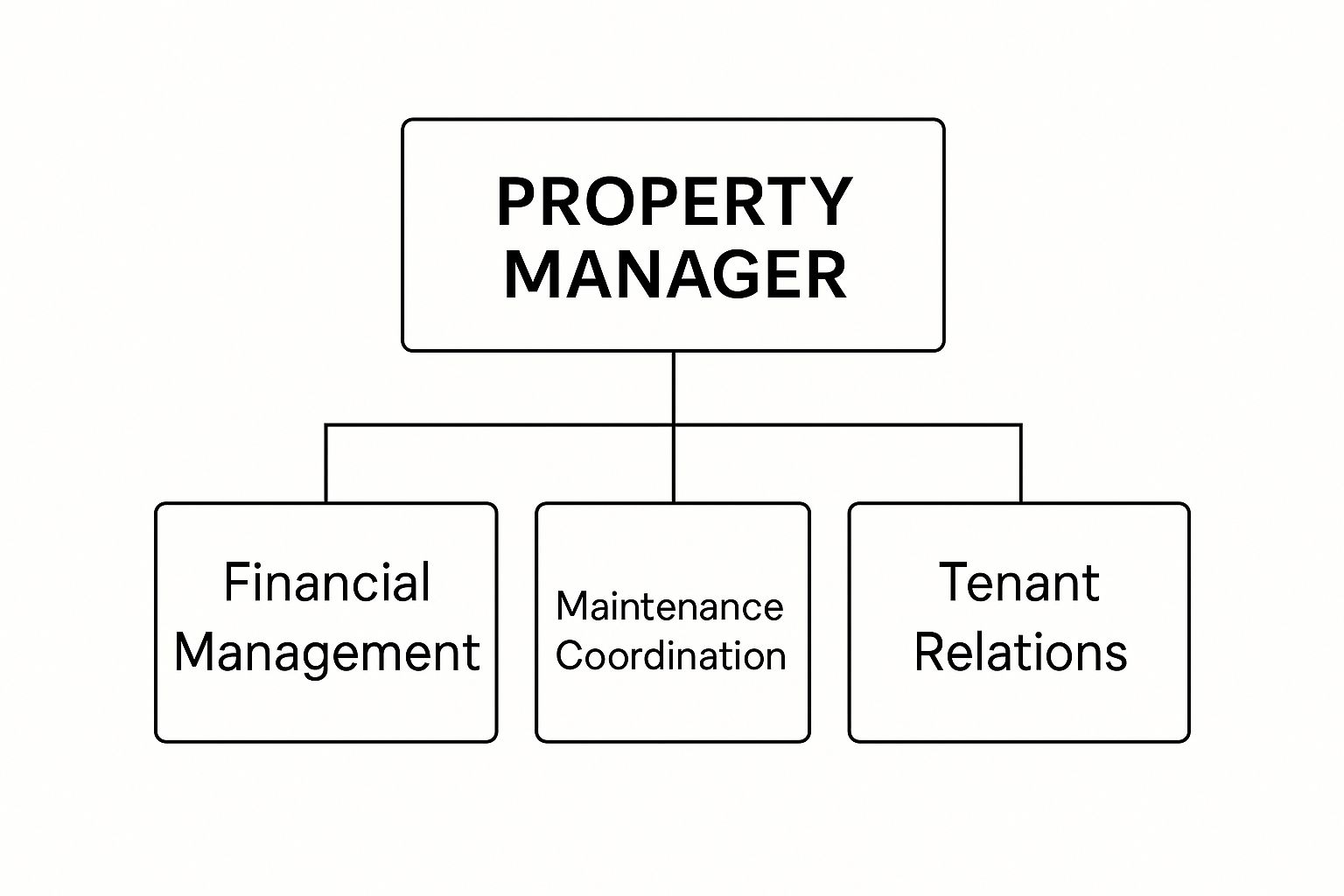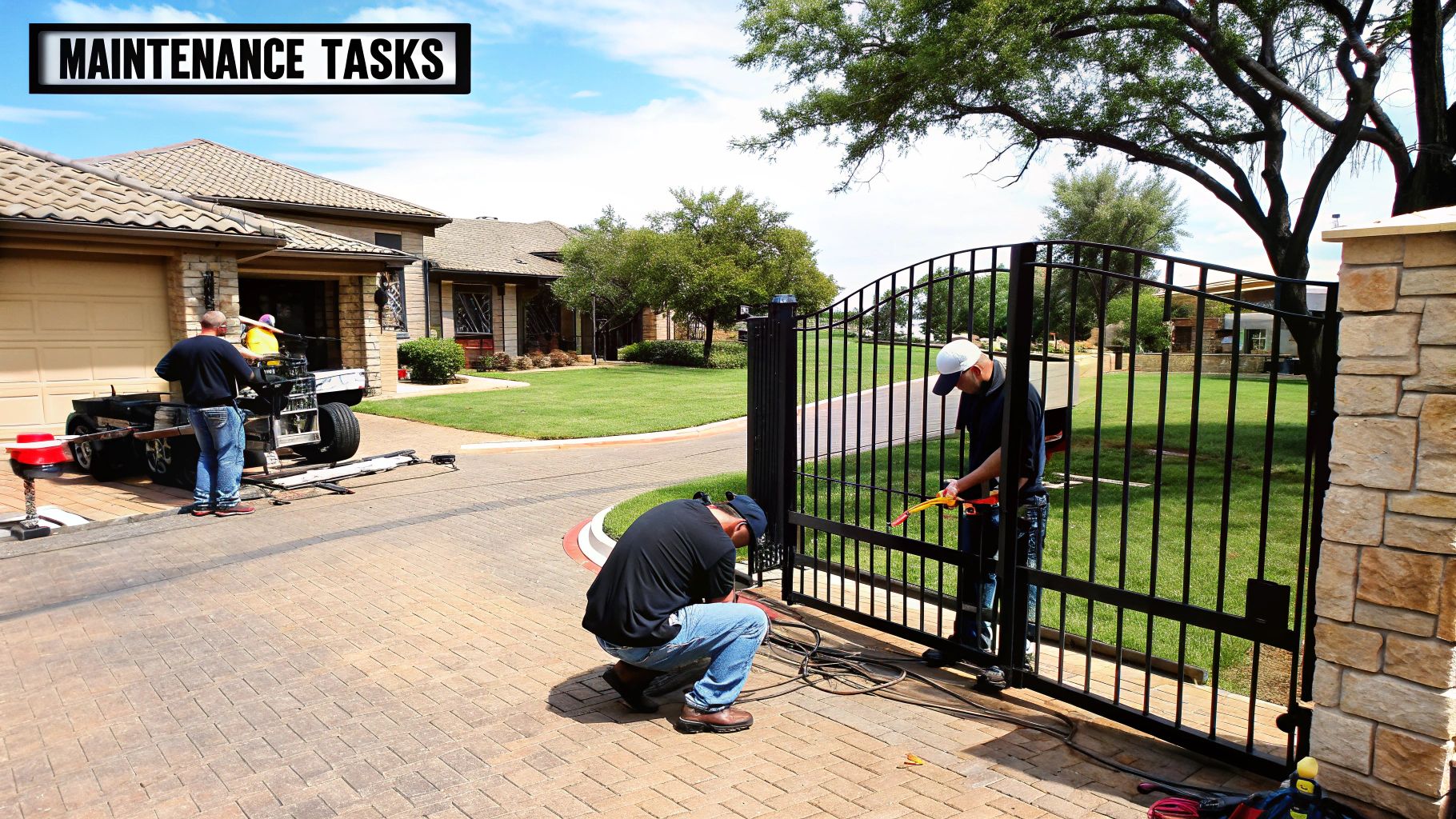What Does a Property Manager Do? Essential Insights
- Sarah Porter

- Sep 13
- 12 min read
At its most basic, a property manager is the professional you hire to run the day-to-day operations of your rental property. They act as the central point of contact for your investment, making sure it stays profitable, well-maintained, and legally compliant. Think of them as blending financial management, tenant relationships, and the physical upkeep of the building into one cohesive role.
The Three Core Jobs of a Property Manager
So, what does a property manager actually do? You can think of them as the CEO of your real estate investment. Instead of getting bogged down in an endless list of individual tasks, it's much easier to group their responsibilities into three main jobs. A great manager has to masterfully juggle the financial side of things, the needs of the people living there, and the physical condition of the property itself.
Each of these pillars is connected. If one area is neglected, the others will suffer. For example, if maintenance is poor, you’ll end up with unhappy tenants, which leads directly to higher turnover and, ultimately, lost rental income. This framework helps you see how every single thing a manager does is designed to protect and grow your investment from all angles.
A Visual Breakdown of Responsibilities
To make this even clearer, the image below shows how a property manager's main duties all flow from their central role.

This visual really drives home how financial, maintenance, and tenant management form the foundation of the job. Now, let’s dig into what each of these core responsibilities really looks like in practice.
Balancing Money, People, and Property
This job goes way beyond just cashing rent checks. It's about running a complex operation to make sure your investment is performing at its peak. That means they have to be a numbers person, a skilled diplomat, and a hands-on caretaker—all at the same time.
A great property manager doesn't just react to problems—they anticipate them. Their value lies in creating systems that minimize risk, maximize income, and preserve the long-term health of the asset.
This kind of forward-thinking approach takes a pretty unique skill set. Your manager needs to be just as comfortable digging into a profit and loss statement as they are mediating a dispute between neighbors or coordinating an emergency roof repair in the middle of the night.
To give you a clearer picture, here's a quick summary of a property manager's core responsibilities, broken down by their main focus.
A Property Manager's Responsibilities at a Glance
Responsibility Pillar | |
|---|---|
Financial Management | Setting market-based rent, collecting payments, managing delinquencies, paying property bills (mortgage, taxes, insurance), and providing detailed financial reports. |
Tenant Management | Marketing vacancies, screening applicants, handling leases, and serving as the primary contact for all tenant communication, requests, and issues. |
Property & Maintenance | Performing regular inspections, coordinating all repairs (both routine and emergency), managing vendor relationships, and ensuring code compliance. |
By mastering these three domains, a property manager turns what could be a stressful, all-consuming headache into a smooth, profitable investment for you.
Managing the Money: Your Financial Steward
Beyond just collecting checks, a good property manager acts as the financial guardian for your investment. Their main job here isn't just to keep the lights on; it's to fine-tune your property's profitability and turn it into a high-performing asset. This takes a strategic approach to everything from setting the right rent to paying the bills on time and giving you a clear picture of what's happening.
It all starts with pricing. A seasoned manager will run a detailed market analysis to land on a competitive rental rate. You want a price that attracts great tenants quickly but doesn't leave money on the table. This isn't a gut feeling—it's a decision based on hard data from comparable properties, what the local demand looks like, and current market trends.

Once the rent is set, the focus immediately shifts to maintaining consistent cash flow. That means having a rock-solid system for collecting rent on time, every time, and professionally handling late payments in a way that complies with the lease and local laws.
Overseeing Income and Expenses
A property manager's financial responsibilities are comprehensive, covering all the money coming in and all the money going out. They handle a whole slate of administrative and operational tasks designed to keep your investment financially healthy.
A huge part of this role is managing every single property-related expense, from taxes and mortgage payments to insurance premiums and maintenance costs. This financial oversight also means you get detailed reports on your property's financial status, occupancy rates, and any upcoming lease expirations.
This diligent management breaks down into a few key areas:
Paying Bills: They handle timely payments for the mortgage, property taxes, insurance, and all vendor invoices, so you never have to worry about late fees or lapses in coverage.
Managing Security Deposits: This involves collecting, holding, and returning security deposits strictly according to state regulations, which can be a legal minefield for landlords.
Financial Record Keeping: They maintain meticulous, transaction-by-transaction records of all income and expenses for your property.
Think of your property manager as your investment's CFO. They're in charge of the financial health, profitability, and reporting that lets you make smart decisions without getting bogged down in the day-to-day numbers.
Providing Clear Financial Reporting
Finally, transparency is everything. A professional manager will provide you with regular, easy-to-understand financial statements, usually every month. These reports are your window into the property's performance, clearly detailing all income, itemizing every expense, and showing your net profit.
This level of detailed financial oversight is absolutely critical for tax time and for accurately tracking your return on investment (ROI) over the long haul. If you’re a landlord looking to get a better handle on your own tracking, our guide on bookkeeping for rental properties made simple is a great place to start.
Ultimately, this consistent reporting gives you the confidence and peace of mind that your asset is truly being managed effectively.
Finding and Keeping the Best Tenants
More than just crunching numbers and scheduling repairs, a massive part of a property manager's job is dealing with people. They're part marketer, part diplomat, and part legal eagle—all rolled into one professional focused on a single goal: finding you fantastic tenants and making sure they want to stay. This is where a good manager’s expertise really shines, saving you from the high cost of vacancies and shielding you from legal risks.
It all starts long before anyone signs a lease. A manager will create compelling marketing for your vacant unit, using professional photos and well-written descriptions to attract a deep pool of qualified applicants. They don't just throw an ad online and cross their fingers; they know exactly which platforms will reach the right people for your specific property.

This initial marketing push is just the beginning. Once the applications start coming in, the real work of tenant management kicks into gear.
The Rigorous Screening Process
This is, without a doubt, one of the most critical jobs a property manager has. They are your first line of defense, running a thorough and legally sound screening process to find responsible residents who pay on time and take care of the place. We’ve all heard the horror stories that start with a rushed screening process.
A professional manager’s system is multi-layered, designed to paint a full picture of every person who applies.
Credit Checks: This gives a clear look into an applicant's financial habits and whether they have a history of paying their debts on time.
Background and Eviction History: This is where you uncover any red flags from previous rentals or criminal records that might signal future trouble.
Income and Employment Verification: This crucial step confirms they have a steady job and earn enough to comfortably cover the rent. A common industry standard is an income of at least three times the monthly rent.
By taking charge of this entire process, your manager doesn't just find better tenants—they make sure every step is compliant with Fair Housing laws, which protects you from messy discrimination lawsuits.
Think of a property manager as the professional buffer between you and your tenants. They handle every phone call, email, and conversation, making sure interactions are always consistent, documented, and by the book.
Building Positive Tenant Relationships
After a great tenant moves in, the focus immediately shifts from finding to keeping. Your manager becomes the go-to person for everything—from routine questions to maintenance emergencies and late-night noise complaints. Having that professional buffer is invaluable. It keeps the relationship professional and ensures that every issue is handled quickly and fairly.
They also handle the entire lease lifecycle, from drafting solid, legally-vetted agreements to proactively managing renewals. By fostering a positive living experience and being responsive, a good manager creates an environment where quality tenants stick around. For more on this, check out our guide with top tips for landlords on how to attract and retain quality tenants.
At the end of the day, this focus on tenant retention is what makes your investment truly profitable by keeping turnover costs down.
Managing the Property and Preserving Your Asset
Beyond the tenants and the rent checks, a huge part of a property manager's job is taking care of the physical building. Think of them as the guardian of your investment, working tirelessly to maintain its condition, protect its long-term value, and ensure it remains a safe and comfortable home for your tenants.
This side of the job is boots-on-the-ground work. One minute they're planning preventative maintenance, the next they're dealing with an emergency repair. It’s not just about calling a plumber when a pipe bursts; it's about having a system in place to prevent that pipe from ever bursting. That forward-thinking approach is what truly sets a great manager apart.

This kind of hands-on management stops small, cheap fixes from spiraling into a five-figure catastrophe that eats into your profits and tanks your property's reputation.
Coordinating Maintenance and Repairs
Your property manager becomes the go-to person for every single maintenance issue, from a finicky garbage disposal to a major roof leak. They field all the calls from tenants, figure out what's really going on, and send the right person to handle it quickly and correctly.
This alone saves you from the monumental headache of trying to find good help on your own. A seasoned manager already has a trusted list of vetted and insured contractors—plumbers, electricians, HVAC pros, and general handymen—who they know will do quality work at a fair price.
This network is worth its weight in gold during an emergency. When a water heater gives out on a holiday weekend, they have someone on speed dial who will actually show up, keeping your tenants safe and minimizing any potential damage to the property.
A property manager’s real value isn't just in fixing what's broken; it's in their ability to see problems on the horizon. They actively work to extend the life of your property's most expensive systems through preventative maintenance and regular checks.
Proactive Inspections and Preventative Care
To truly protect your investment, a manager can't just wait for things to break. This is where a structured maintenance and inspection schedule comes in. These regular check-ups are all about catching small issues before they become big, expensive ones. You can dive deeper into this topic in our landlord's guide to rental property inspections.
This preventative strategy involves a few key actions:
Routine Property Walk-Throughs: Regular inspections, both inside and out, to spot safety hazards, potential lease violations, and the first signs of wear and tear.
Seasonal Maintenance: Smart, timely tasks like servicing the HVAC system before the summer heat hits, clearing out gutters in the fall, and winterizing pipes to avoid a frozen disaster.
Ensuring Code Compliance: They stay on top of local health and safety codes, which protects you from fines and legal trouble.
At the end of the day, this diligent physical oversight keeps your property in great shape, making it a place tenants want to stay. That means lower vacancy rates and a healthier return on your investment.
Why Landlords Hire a Property Manager
Thinking about hiring a professional to manage your rental property? For many owners, it feels like just another expense. But I've found it's one of the smartest financial decisions an investor can make. It goes way beyond just saving you time. A great property manager actively boosts your bottom line, shields you from risk, and completely removes you from the day-to-day operational grind.
They essentially become your strategic partner, transforming a hands-on headache into a high-performing, genuinely passive investment.
And it's not a niche service anymore; it's becoming the standard. The U.S. property management market is set to grow from $81.52 billion in 2025 to a staggering $98.88 billion by 2029. That kind of growth tells you just how much value investors are getting.
It’s a field built for scale, too. About 35% of property managers oversee portfolios of between 101 and 500 units, which shows just how effective their systems are. You can dive deeper into these numbers with some key property management statistics on Doorloop.com.
Maximizing Profitability and Minimizing Vacancies
Every landlord knows that vacancy is the ultimate profit killer. An empty unit isn't just neutral—it's a liability, costing you money every single day.
A skilled property manager attacks this problem head-on. They use professional marketing strategies to attract a much larger pool of qualified applicants, which dramatically shortens the time your unit sits empty between tenants.
But their real magic lies in securing higher-quality tenants through rigorous screening. This pays dividends for years to come. Why? Because better tenants are far more likely to:
Pay rent on time, giving you reliable, consistent cash flow.
Take better care of the property, which means fewer repair bills and less wear and tear.
Stay longer, minimizing the high costs associated with turnover, like lost rent, cleaning, and leasing fees.
This isn't just about filling a space; it's about filling it with the right person. That proactive approach translates directly into more money in your pocket each month.
A property manager’s true value isn't just in what they do, but in what they prevent. They are your shield against costly legal mistakes, extended vacancies, and the stress of dealing with difficult situations.
Navigating Legal Complexities and Difficult Situations
The rental industry is a minefield of federal, state, and local laws. It's incredibly easy to make a mistake. A simple error, like mishandling a security deposit or accidentally violating Fair Housing regulations, can land you in legal hot water with severe financial penalties.
Property managers are experts in landlord-tenant law. Their job is to make sure every single action—from the lease signing to the move-out inspection—is fully compliant.
This expertise becomes absolutely critical when you're facing a tough situation like an eviction. They handle these emotionally charged processes with professionalism and efficiency, following strict legal protocols to protect you and your asset. Letting a pro manage these complexities doesn't just save you from potential lawsuits; it gives you invaluable peace of mind.
Frequently Asked Questions
Making the decision to bring in a professional is a big one for any rental owner. It's smart to have questions. Here are some of the most common ones we hear from investors who are trying to figure out what a property manager really does and if it's the right move for them.
How Much Do Property Managers Typically Charge?
It’s the first question on everyone’s mind, and the answer is: it depends. Most property management fees land somewhere between 8% to 12% of the monthly rent that’s actually collected. You'll also see some companies offering a flat-fee model, which can be appealing depending on your property's rent price.
But the base fee isn't the whole story. You need to get crystal clear on what that percentage actually covers. Day-to-day oversight is standard, but you'll often find separate charges for bigger, less frequent tasks.
Be sure to ask about things like:
Leasing Fees: This is a common one-time fee for the work involved in finding and screening a new tenant. It's often a percentage of the first month's rent.
Eviction Costs: If you unfortunately have to remove a tenant, there are legal and administrative costs involved. This is almost always a separate charge.
Major Project Coordination: Need a new roof or a full HVAC replacement? A manager might add a surcharge for overseeing those larger, more complex jobs.
When Should I Hire a Property Manager?
There isn't a magic number of doors or a specific income level that signals it's time. Instead, it often boils down to a feeling: has your investment started to feel less like an asset and more like a demanding second job? If you just nodded your head, it's probably time.
Consider hiring a property manager when the time, energy, and stress of doing it all yourself start to feel more expensive than their fee. Your rental property should be building your wealth, not draining your life.
For some people, this tipping point comes when they buy their second or third property. For others, it's when they move an hour away from their rental. And for many, it's simply realizing they don't have the time—or the desire—to field late-night maintenance calls and chase down rent anymore.
What Should I Look for in a Good Property Manager?
You're not just hiring a vendor; you're choosing a partner to manage a major financial asset. So, where do you start? First, make sure they're a licensed professional with a solid reputation right there in your local market. It's also a huge plus if they have direct experience with properties just like yours, whether it's a single-family home or a small apartment building.
Beyond those table stakes, you're looking for signs of a truly great operator. Pay close attention to their communication style—are they clear, responsive, and professional? Ask to see a sample owner statement to make sure their financial reporting is transparent and easy to follow. A great manager will also have a deep bench of trusted, affordable contractors they can call on.
Don't skip the due diligence. Always ask for—and actually call—references from other property owners. And be sure to read online reviews from both owners and tenants. The tenant experience often tells you everything you need to know about how they'll care for your property.
Ready to turn your rental property into a genuinely passive investment? The team at Keshman Property Management has over 20 years of hands-on experience helping owners in the trenches, maximizing their returns while minimizing the headaches. Learn more about our transparent, owner-focused services.

Comments